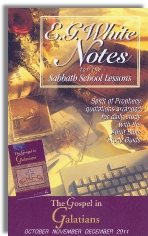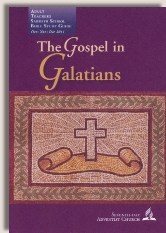|
||||||||||
The Sabbath School Bible Study Guide and the corresponding E.G. White Notes are published by Pacific Press Publishing Association, which is owned and operated by the Seventh-day Adventist church. The current quarter's editions are pictured above.
Official Adventist Resources:
Sabbath School Network Online Sabbath School Lessons
Search the Complete Published Ellen G. White Writings
Support this project
If you would like to support this website, please click on the following link to donate online or you may mail your check to: Life Assurance Ministries, PO Box 905, Redlands, CA 92373. Mark your check "Bible Studies."

Fourth Quarter 2011 (October–December)
Commentary on "Introduction to The Gospel in Galatians"
DALE RATZLAFF
From Sabbath in Christ, used by permission of the publisher
But now that you have come to know God, or rather to be known by God, how is it that you turn back again to the weak and worthless elemental things, to which you desire to be enslaved all over again? You observe days and months and seasons and years. I fear for you, that perhaps I have labored over you in vain (Gal. 4:9–11).
To understand these verses correctly we must again see them in their context. The central issue in the book of Galatians is the old covenant law and its relationship to righteousness for the Christian. There were some in the Galatian church who were teaching that Christians must observe the old covenant law.
Tell me, you who want to be under law, do you listen to the law? (Gal. 4:21)
Paul’s answer to these false teachers is very clear. We will discuss more fully Paul’s argument in relationship to the law in subsequent chapters; nevertheless for now note his clear, powerful statements regarding old covenant law.
Therefore the Law has become our tutor to lead us to Christ, that we may be justified by faith. But now that faith has come, we are no longer under a tutor (Gal. 3:24,25).
Paul likens the law to a tutor and then in the next verse says we are no longer under a tutor. Christians are no longer under old covenant law. Nothing could be stated more clearly.
With this context clearly in mind, look again at our passage.
Days, months, seasons, and years
But now that you have come to know God, or rather to be known by God, how is it that you turn back again to the weak and worthless elemental things, to which you desire to be enslaved all over again? You observe days and months and seasons and years. I fear for you, that perhaps I have labored over you in vain (Gal. 4:9–11).
Notice that Paul again uses the term “elemental things.” This is a term he uses elsewhere to refer to old covenant law. What were the days, months, seasons and years? The central issue in the church of Galatia was the law and its relationship to righteousness for the Christian. Paul’s opponents were seeking to persuade the Galatians to observe the law. This is what Paul is fighting. He shows that the observance of the law as a requirement puts one under a curse for any failure to keep it perfectly. In the context of what was taking place in Galatia and with what we have learned from our study of Colossians 2:16, it should be clear that some of the Galatians had been persuaded by the Judaizes to observe the convocations of the old covenant. These days, months, seasons and years can be nothing other than Sabbaths (days), the new moon celebrations (months), the annual feasts (seasons) and sabbatical years (years). Notice these are listed in ascending order as they often are in the Old Testament record.
There are some who attempt to say that the problem with the Galatian teachers was not that they were teaching against the rituals of the old covenant law, rather they were “motivated by superstitious beliefs in astral influences” and were teaching “the perverted use of cultic observations”.
This, I believe is without foundation. If one reads through the whole book of Galatians at one time, it becomes patently evident that Paul is, indeed, dealing with Judaizers who were promoting the rituals of old covenant law. Paul does, however, equate the false gospel of the Judaizers with witchcraft and in that sense, even paganism.
You foolish Galatians, who has bewitched you, before whose eyes Jesus Christ was publicly portrayed as crucified? (Gal. 3:1)
The reason for this is that the false gospel of Christ plus works of the law denies the very heart of the Gospel and places Christianity on the same level as Christless Judaism, even paganism. Because Christ and the Father are One, when the Jews rejected Christ, they in essence, rejected the Father as well.
…he who rejects Me rejects the One who sent Me (Lk. 10:16).
Conclusion
We have a clear reference to the seventh-day Sabbath in this passage for the following four reasons.
- The context of the book of Galatians, including chapter 4, is dealing with those “who want to be under law.”
- Paul’s use of “elemental things” usually, if not always, refers to that which is contained in the old covenant.
- The Galatians were observing days, months, seasons, and years, thus placing themselves back under old covenant law.
- These convocations are listed in ascending order.
Implications
If we accept that the seventh-day Sabbath is here in view, what are the implications? There are many of deep significance. For the Christian, the Sabbath is “weak and worthless” (v. 9). This fits in perfectly with the other ritual laws of the old covenant which were a shadow of Christ. For the Christian the Sabbath is enslaving (v. 9). Some Sabbath-keepers would disagree strongly with this. However, those who have tried to observe the Sabbath according to biblical guidelines know that it is nearly impossible to keep the Sabbath. For the Christian, the observance of the Sabbath may undermine his standing in Christ. “I fear for you, that perhaps I have labored over you in vain” (v. 11). For the Christian the Sabbath should be treated just like the new moons, the annual feasts, and the sabbatical years of Judaism—not required or expected practice for new covenant Christians.
Galatians 4:21–31
Remember that the book of Galatians was written to those who had been misled by the Judaizing teachers and who “wanted to be under law” (Gal. 4:21). The context deals expressly with our subject matter. Therefore, it, too, has the highest teaching authority. In Galatians 3:17 Paul states that the Law “came four hundred and thirty years” after the promise to Abraham. Thus, Paul agrees with the old covenant record that this covenant “was not made with the fathers” (Deut. 5:3). In answer to “Why the Law?” Paul says, “It was added because of transgressions...until the seed should come to whom the promise had been made” (Gal. 3:19). Verse 16 defines this “seed” as Christ.
Paul continues,
But before faith came, we were kept in custody under the law, being shut up to the faith which was later to be revealed. Therefore, the Law has become our tutor to lead us to Christ, that we may be justified by faith. But now that faith is come, we are no longer under a tutor (Gal. 3:22).
The following chart illustrates Paul’s teaching:

Here, in contextual teaching, Paul calls the law our tutor and then says we are no longer under a tutor. In other words he is saying that the old covenant law no longer has authority over the life of a Christian. But can we be sure this is what Paul really means? Yes. Note carefully his powerful allegory.
Tell me, you who want to be under law, do you not listen to the law? For it is written that Abraham had two sons, one by the bondwoman and one by the free woman. But the son of the bondwoman was born according to the flesh, and the son by the free woman through the promise. This contains an allegory: for these women are two covenants, one proceeding from Mount Sinai bearing children who are to be slaves; she is Hagar. Now this Hagar is Mount Sinai in Arabia, and corresponds to the present Jerusalem, for she is in slavery with her children. But the Jerusalem above is free; she is our mother...And you brethren, like Isaac, are children of promise. But as at that time he who was born according to the flesh persecuted him who was born according to the Spirit, so it is now also. But what does the Scripture say? Cast out the bondwoman and her son, for the son of the bondwoman shall not be an heir with the son of the free woman. So then, brethren, we are not children of a bondwoman, but of the free woman (Gal. 4:21–31).
The following chart will help us understand this passage:
Old Covenant |
New Covenant |
Hagar = Bondwoman |
Sarah = Free woman |
Sinai-Jerusalem |
The Jerusalem above |
Son of the bondwoman |
Son of the free woman |
Born of flesh |
Born of promise |
In slavery |
In freedom |
Persecuting |
Persecuted |
(Like Ishmael) |
Like Isaac |
Born according to flesh |
Born according to Spirit |
Conclusions: (Gal. 4:30, 31)
- “Cast out the bondwoman.” = Cast out the old covenant.
- Cast out “her son.” = Cast out those who promote the old covenant.
- “For the son of the bondwomen shall not be an heir with the son of the free woman.” = The terms of covenants are mutually exclusive.
- “We are not children of a bondwoman.” = We are not under the old covenant.
- We are children “of the free woman.” = We are under the new covenant.
Here, in clear contextual teaching over several chapters, Paul states in three specific ways that Christians are not under the authority of the old covenant.
- The Law was given 430 years after Abraham and was in effect until the coming of Christ.
- With the coming of Christ we are no longer under the Law.
- Christians are to “cast out” the old covenant and those who promote its being kept.†
Copyright 2011 BibleStudiesForAdventists.com. All rights reserved. Revised September 19, 2011. This website is published by Life Assurance Ministries, Glendale, Arizona, USA, the publisher of Proclamation! Magazine. Contact email: BibleStudiesForAdventists@gmail.com.
HOME | 2011 | FOURTH QUARTER | INTRODUCTION

